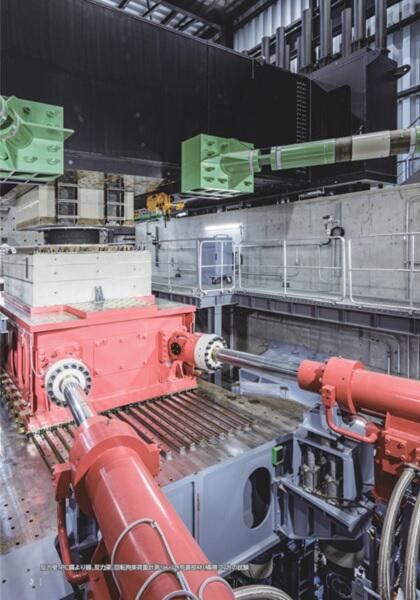On June 24, the Ministry of Land, Infrastructure, Transport and Tourism announced that the Japan Seismic Isolation Laboratory (Representative Director: Akira Wada, Professor Emeritus of Tokyo Institute of Technology) launched a seismic isolation dynamic performance certification system on July 1. The performance of seismic isolation equipment is evaluated using E-Isolation, a full-scale seismic isolation tester with world-class accuracy, which has not been available in Japan until now. This system is expected to contribute to further improving the reliability of seismic isolation structures.

Provided by the Japan Seismic Isolation Laboratory
Seismic isolation structures are effective in considerably reducing damage to buildings and ensuring the continuity of their functions during earthquakes and have been used widely in government buildings, hospitals, and other structures. The Noto Peninsula earthquake occurred in January of this year caused severe damage to wooden buildings. However, there are reports of hospitals with seismic isolation structures that continued functioning even after the earthquake. Meanwhile, the falsification of data in high-damping-laminated rubber seismic isolation bearings by Toyo Tire & Rubber Co. in March 2015 and in the shipment inspections of oil dampers for seismic isolation and vibration control structures by KYB and Kawakin Core-Tech in October 2018 became major problems when disclosed. Although these products were replaced with legitimate products, this replacement was very costly, labor intensive, and time consuming. The root of this falsification problem lies in the fact that there were no testing machines in Japan that can conduct "full-scale, full-load, full-displacement, and full-speed tests" in the first place.
To solve this fundamental problem, as part of the Strategic Innovation Promotion Program (SIP) led by the Council for Science, Technology and Innovation (CSTI) of the Cabinet Office, the Japan Seismic Isolation Laboratory, Tokyo Institute of Technology, and Kyoto University have jointly developed a full-scale seismic isolation testing machine called "E-Isolation." The fabrication of the testing machine was completed last year in a disaster prevention park in Miki City, Hyogo Prefecture and has been operating on a trial basis. This full-scale seismic isolation testing machine can examine the dynamic performance of full-scale seismic isolation devices and is unique in the world in its ability to measure loads with high accuracy from moment to moment.
The seismic isolation dynamic performance certification system, which started on July 1, tests and evaluates the dynamic performance of full-scale seismic isolation devices using "E-Isolation," which is managed and operated by the Japan Seismic Isolation Laboratory. Under this system, there are two types of certifications: a dynamic performance certification, which is conducted once every three years for the manufacturers' main products that are widely used as seismic isolation equipment, and an individual dynamic performance certification, which is conducted for seismic isolation equipment used in individual building projects. For seismic isolation equipment used in buildings, it is necessary to obtain ministerial approval under the Building Standards Law after evaluating their performance through various tests. Even after obtaining this approval, they require periodic performance verification. The results of the dynamic performance certification initiated currently can be used to evaluate performance for obtaining the ministerial certification.
This article has been translated by JST with permission from The Science News Ltd. (https://sci-news.co.jp/). Unauthorized reproduction of the article and photographs is prohibited.




